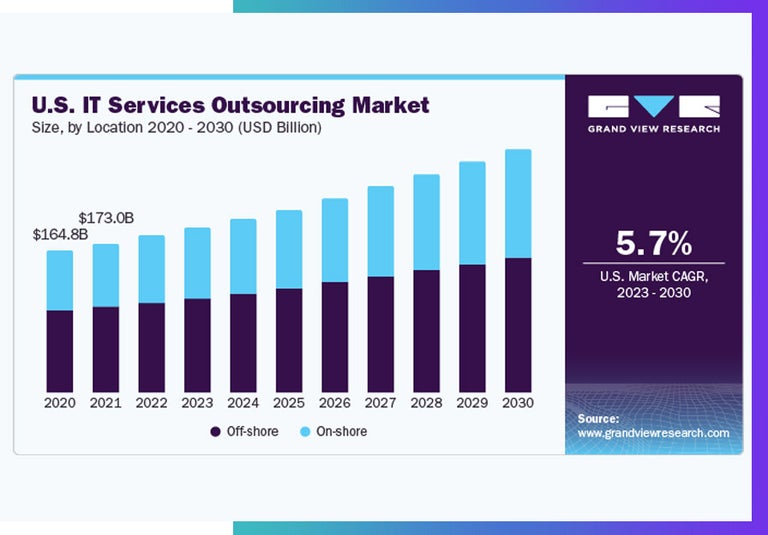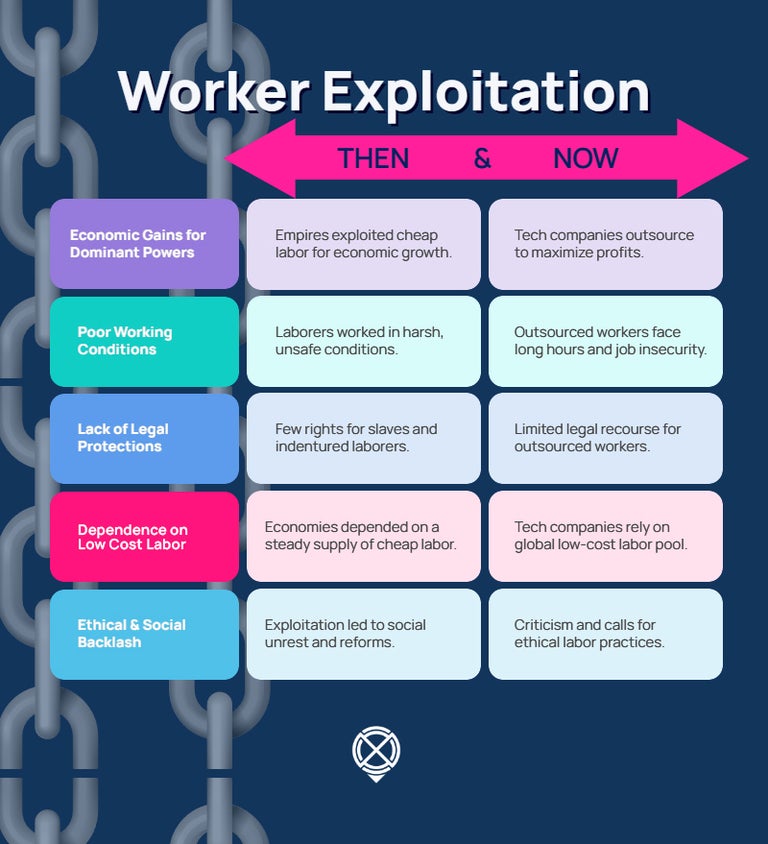Contents
- Outsourcing as Rebranded Cheap Labor
- 1. Understand the Money Dynamics
- 2. Know What Exploitation Looks Like
- 3. Recognize The Power Imbalance
- 4. Tap into Strategies for Fair Treatment
Four ways to handle a system designed to exploit you.
I was once a ‘third party vendor.’
A freelancer. An external resource. An on-demand consultant.
These labels are uncomfortable, and they’re tinged with regret. Because being a remote worker in a non-US country exposes you to rampant exploitation, in many forms.
I spent the last 15 years working with US tech companies from Atlanta and New York to Silicon Valley itself. Being South African had its challenges.
Here’s the traumatic truth: outsourcing is modern day oppression.
It’s unethical. It traps good people in cycles of burnout, pays them far less than they’re worth, causes mental, physical and emotional struggle – and it has to stop.
- Global outsourcing doubled between 2000-2019 from $45-92 trillion.
- In 2022 IT outsourcing was valued at 639 billion, by 2030 it will be 1,180 billion.
- India, The Philippines, Mexico, Brazil and Eastern Europe are favorites.

It’s growing at a blinding pace.
So, there’s an urgent need to educate remote workers about outsourcing, exploitation and how to avoid it. That’s what this article is for.
To equip you with the knowledge to fight back so that you can avoid years of ill health as overworked, underpaid outsourced labor. To hell with that.
You deserve better.
Outsourcing as Rebranded Cheap Labor
Civilizations have been exploiting foreign workers forever.
- The Roman, British and Spanish Empires all snatched people from their indigenous lands and forced them into slavery or enforced labor
- Poorly paid Chinese immigrants built American railroads in the 19th Century
- Migrant labor endures low paid work in the Gulf States today
It’s nothing new.
Now we have corporate exploitation.
And it’s on the rise!
Despite what pro-outsourcing advocates say, there are striking similarities between these systems – with one key difference: remote work.
Remote work allows these dynamics to take root in a far more insidious manner.
Because outsourcing is packaged as a win-win, when it really isn’t one for the majority of global workers engaged in its practice.
Look at this:

Pretty chilling when it’s all laid out in black and white, right?
Even more so when you consider this system is elective. We choose to take part in it.
It’s HARD to be a remote worker these days.
This is the BS system you need to avoid so that you can take advantage of the best parts of remote work: being with family more often, the flexibility to go anywhere at anytime and the power to build a life that reflects your ultimate potential.
Here are four ways to fight back.
1. Understand the Money Dynamics
Money dynamics matter.
And outsourcing financially benefits US companies at the expense of fair pay for global talent.
If you’re born in a country outside of the US but have the skills, ability and experience to do the work required – you’re paid less for it.
It’s an unfair penalty levied on non-US workers.

There is a global wage gap that is ever-widening as outsourcing spreads.
- Several studies suggest that outsourcing decreases pay for skilled workers
- Outsourcing jobs to ‘cheap labor’ forces down pay inside of the US
Highly skilled workers don’t benefit financially from outsourcing, and neither do local remote workers. It’s the tech companies who are saving money by hiring great people overseas willing to be paid less than they’re worth.
For bigger profits!
These companies want to pay you AS LITTLE AS POSSIBLE.
Not because they can’t afford it. Or because they have a limited budget.
Their goal is cheap labor to save money. They’re in it because foreign remote workers often expect less pay and will benefit from a stronger US dollar.
2. Know What Exploitation Looks Like
In my twenties I worked for a US content company that outsourced articles to me.
I was paid $15.00 an article, and had to write at least 10 a day. That’s $150.00 for 10 articles, or roughly – 15-18 hours of work. That’s $750.00 a week, or $3000.00 a month.
Back then 1 USD = R8.00.
On paper for an inexperienced writer, R24,000 was a lot.
But it cost 200 articles a month, and 90-hour weeks. I worked non-stop and endlessly, chasing daily deadlines like a lunatic to make my client happy.
My physical and mental health suffered significantly. Work was my life.
Then the exchange rate dropped to R7.00 per USD earned.

My income plunged to R21,000 that month. Couple that with taxes, transfer fees, payment delays, inflation and the increasing cost of living – I had less than nothing.
Less than what I would have earned as a local school janitor.
When I asked for an increase they said no, but I can do 20 articles a day.
Exploitation doesn’t always look that way on paper – at first. But you feel it. And the way you feel it most is in the overwork-underpaid cycle of survival.
- You’re not being paid enough to live
- You’re working too many hours
- You’re overproducing and completely burning out
- You’re forced into a state of survival
Based on my own experiences as an outsourced worker, I know how easy it is to get stuck focusing on the wrong things. I believe some managers rely on that.
- When you struggle financially you focus on short-term needs
- You are more likely to crack on in a low paid job
- You don’t have the drive or energy to do anything else
- Stress, pressure and depression wear you down
- You become disconnected from everyone in your life
I’m here to tell you that being forced into a constant state of survival mode keeps you from success. It locks you into bad working relationships. It steals your potential!
These companies want THE MOST for THE LEAST.
Outsourcing is a trap when the cost is your health, happiness and career.
Here are some other ways exploitation shows up in outsourcing:
- Pay suppression / Actually, you’re being paid less than local wage (do your research!)
- No overtime / Pay is per service/product so no overtime is paid, ever
- Unrealistic deadlines / Your time doesn’t belong to you it belongs to them
- No contract / They can vanish anytime without a trace (and do!)
- Career suppression / Stuck doing the same thing with zero upward mobility
- No accountability / There are always payment delays/bad payment terms
- No communication / You are an avatar that can’t ask for anything human
- No ownership / You sign away intellectual rights for nothing
- No protection / If they screw you over, that’s your bad luck
- Empty promises / Future increased pay, promotions, incentives that don’t happen
Of course, there are variations of these extremes. So, look out for elements of these outsourcing tricks in a job that – on the surface – seems beneficial.
3. Recognize The Power Imbalance
“Do you ride on a lion or elephant to get to the shops?”
A US client once asked me this in a call. I was further along in my career, and was being interviewed for a tech role - so it rightly raised some red flags.
As Geraldine Mupandanyama said in one of our Out of Office episodes – many US companies have a distorted perception about the African continent. And its people.
You can watch the episode here.
There’s a pervasive perception that all non-US workers are underprivileged, poor and technologically stunted. Companies that outsource cheap labor tend to have people that hold these beliefs rather close.
I chalk it up to a power imbalance in the outsourcing dynamic.
An audacious entitlement.

Because the company comes from a developed country with a strong currency, countries that are developing with weaker currencies are seen as less-than.
This causes a massive imbalance in bargaining power between remote workers and US companies.
Here’s how it shows up:
- Zero willingness to negotiate fair pay
- Arguing that ‘cost of living’ adjustments are fair (they aren’t)
- Vague job parameters to make room for scope creep and expanding work
- Attitude that you’re ‘lucky’ and should be thankful for the opportunity
These companies DON’T CARE about you.
If you as a remote worker see this power imbalance in your outsourced remote job, it’s a danger signal.
They are communicating to you that you mean nothing, are entirely dispensable, and they can treat you however they see fit as a result.
Run.
You’re not an orange, and don’t deserve to have every drop of goodness squeezed from you, for any reason.
4. Tap into Strategies for Fair Treatment
Here we are.
Remote workers in a world full of companies who want to force you to become their cheap labor.
Don’t let them!
Like I said earlier, this system is insidious because it’s positioned as a good thing for you, when most of the time the opposite is true.
I’ve never met a remote worker who hasn’t had a trial by fire like this with SOMEONE online. But it’s up to you to spot exploitation before it takes hold and crush it.

Here’s how:
- Know your worth in the global market: Know what you should be earning based on your skills, ability and experience and never deviate from that. When you accept lower paid work, you’re screwing yourself out of money. And you need money for everything these days. Pay yourself first!
Only accept remote jobs that pay you what you’re worth.
- Adjust how you think of your time: We spend a third of our lives working – that’s 90,000 hours over your lifetime. It’s not infinite, so get used to the idea that when you work, you should be improving how things are, now and in the future. Stop wasting time on autopilot. Let’s invest your time where it matters.
Only accept remote jobs that respect your time and improve your career.
- Vet your job like your life depends on it: Because it does! Break out of survival mode mindset and start questioning who you choose to work with. Are they good enough for you? Do they give you what you need to do your best? Is this the kind of environment that ignites your creativity and passion? Be discerning.
Only accept remote jobs that feel like they fit into how you want to live your life.
Finally, practice saying no.
Say it often.
The most successful remote workers say no to most things. And it frees them up to be available for the truly incredible things that catapult their careers forward.
I’ve been at Crossover for nearly 2 years now. It’s the kind of remote job you dream of when you’re young and inexperienced.
I’m paid what I’m worth, my time is respected, and I’m surrounded by the smartest people in the world. Together, we’re building amazing things.
If you’re caught in the outsourcing nightmare, this is your sign to break-free. There are better things out there waiting for you.
And you can choose them.
Outsourcing is modern-day oppression. Remote workers everywhere must rise against this expanding exploitation.
Armed with knowledge, you can challenge the system that underpays and overworks you. Recognize your worth, demand fair compensation, and refuse jobs that don’t respect your time and talent.
By saying no to exploitative practices, you open doors to opportunities that honor your skills and potential.
Remote work should empower you to live your best life, not trap you in cycles of burnout. Choose wisely, fight back, and reclaim your career.
The future of remote work is in your hands – make it a future you deserve.









